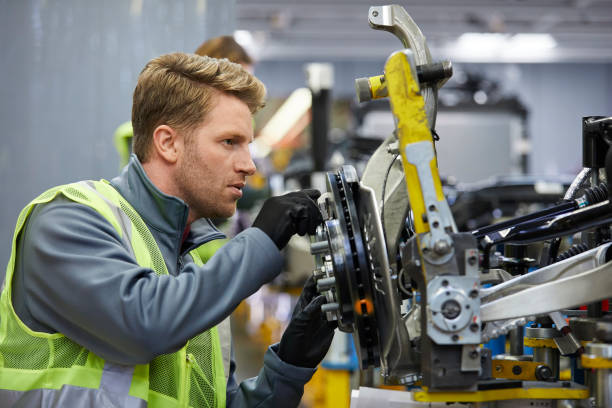Mechanical engineering: The world of mechanical innovation
Published

Fundamentals of mechanical engineering: of forces and movements
Mechanical engineering is a fascinating field that deals with the design, analysis and manufacture of mechanical systems. In its fundamentals, it deals with the basic principles of forces and motions that form the basis for the development of machines and devices. Here are some important concepts and aspects of the fundamentals of mechanical engineering:
- Forces and moments: Understanding forces is crucial in mechanical engineering. Forces are physical influences that affect the movement and balance of objects. Moments are forces that act around a point or an axis and can cause rotational movements.
- Kinematics: Kinematics deals with the movement of bodies regardless of the forces that cause them. It includes concepts such as speed, acceleration and path-time diagrams, which are of great importance for the design of mechanisms and gears.
- Static and dynamic: Static analysis deals with systems in equilibrium, while dynamic analysis examines the movement of objects under the influence of forces and moments. Both approaches are relevant in different phases of mechanical engineering design.
- Machine components: The fundamentals of mechanical engineering include the study of components such as bearings, belts, gears and shafts that are used in machines to transmit movements and forces.
- Simulation and modeling: With the help of computer simulations and modeling techniques, engineers can analyze and optimize the performance and behavior of mechanical systems in advance, before they go into production.
These fundamentals form the foundation for the development of machines and devices used in a wide range of industries, from automotive to aerospace. Understanding forces and motion enables mechanical engineers to develop innovative solutions to technical challenges and shape the world of mechanics.
Mechanical construction: design and material selection
Mechanical design is a crucial step in the mechanical engineering process where ideas and concepts are transformed into physical models and products. This process requires a deep understanding of materials, strength theory and design principles. Here are some important aspects of mechanical design:
- design process: Mechanical design begins with brainstorming and concept development. Engineers create sketches, models and drafts to define and plan the desired product.
- Material selection: Choosing the right materials is crucial. Engineers consider factors such as strength, durability, weight, cost and environmental impact.
- Strength analysis: Strength analyses are carried out to ensure that the design can withstand the loads. This includes the calculation of stresses, deformations and safety factors.
- Design software: The use of CAD (computer-aided design) software is widespread in modern mechanical design. It enables the creation of detailed 3D models that can be used for production and analysis.
- Manufacturing techniques: In mechanical design, engineers must consider the manufacturing techniques that will be used to produce the product. This can include turning, milling, welding, 3D printing and many other processes.
Mechanical design is central to ensuring that products can be manufactured efficiently, meet the requirements and fulfill the desired purpose. It plays a key role in industries such as automotive, aerospace, medical technology and many others where innovative and reliable solutions are required.
Mechanical engineering in industry: production and automation
Mechanical engineering plays a central role in industrial production and automation. This field is all about designing efficient production processes, ensuring quality and optimizing costs. Here are some important aspects of mechanical engineering in industry:
- Manufacturing processes: Mechanical engineers develop and optimize manufacturing processes, including assembly lines, CNC machining, welding processes and 3D printing, to produce products on a large scale.
- Automation: Automation plays a crucial role in increasing productivity and reducing labor costs. This includes the use of robots, programmable logic controllers (PLC) and advanced sensor technology.
- Quality control: Mechanical engineers develop quality control and inspection systems to ensure that products meet the required standards. This can include image processing, metrology and statistical analysis.
- Production planning: The planning and optimization of production processes, warehousing and supply chain management are also part of mechanical engineering in the industry. This ensures the timely delivery of products and minimizes bottlenecks.
- Sustainability: Sustainability aspects are becoming increasingly important. Mechanical engineers are developing environmentally friendly manufacturing processes and working on solutions to reduce resource consumption and waste production.
Mechanical engineering in industry is crucial for the production of goods on a large scale and contributes to economic development. Through automation, optimization and the integration of technologies, it helps to increase the efficiency and competitiveness of companies in various sectors.
Energy efficiency and sustainability in mechanical engineering
Energy efficiency and sustainability have become increasingly important in mechanical engineering. Engineers in this field are working to develop energy-efficient solutions that conserve resources and minimize environmental impact. Here are some important aspects of energy efficiency and sustainability in mechanical engineering:
- Efficient use of energy: Mechanical engineering aims to develop machines and systems that use energy efficiently. This can be achieved through improved heat recovery, power control and optimized processes.
- Sustainable materials: The selection of sustainable and environmentally friendly materials is a key aspect. This includes the use of recycled materials, biodegradable plastics and the reduction of waste.
- Life cycle analysis: Engineers carry out life cycle assessments to evaluate the environmental impact of a product from manufacture through use to disposal. This makes it possible to identify potential for improvement.
- Alternative energy sources: The use of renewable energy sources such as solar and wind energy in industry helps to reduce CO2 emissions. Mechanical engineers are developing systems to integrate these energy sources into production processes.
- Minimize environmental impact: The mechanical engineering industry is working to minimize waste and emissions. This includes the development of effective exhaust gas purification systems and recycling processes.
Energy efficiency and sustainability in mechanical engineering not only make ecological sense, but can also lead to cost savings and competitive advantages. Companies that focus on sustainable production and energy-efficient technologies are well equipped for the future and help to tackle global environmental impacts.








